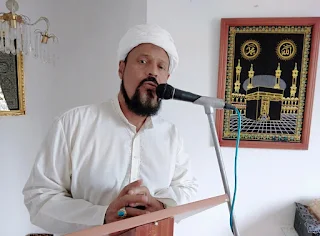Alhamdulillah, Summa Alhamdulillah, since last two weeks I have expounded before you on an important subject, i.e.
the errors that all Muslim believers must avoid while praying [Salat]. Being
an important pathway to Allah, each Muslim must see to it that he perfects his Salat so that his connection with Allah
is perfected, the path leading to Allah is wide open, pure and clear. So, let
us see the rest of the errors which the Mussalli does while praying.
21) Neglecting to sit in the Iftirash or Tawarruk position in the prayers during the last Tashahhud [i.e. sitting position].
It is praiseworthy to take Iftirash or Tawarruk position
only in the last sitting position of prayer, i.e. during the last Tashahhud. So, what is Iftirash and what is Tawarruk ? How do we define them? The Iftirash
position is to place the left foot on its side and sitting on it; and keeping
the right foot vertical while resting on the bottom of the toes turning them towards
the Qibla.
The Tawarruk position
is when a person sits with the left posterior on the ground; his right foot
placed vertically with toes pointing towards the qibla; and the left foot on
its side emerging from under the right foot.
Concerning the Tawarruk position, Hazrat Abu Humayd al-Sa’idi (ra) narrated: “I
have preserved for you the Prophet’s (pbuh) prayer; I saw him… when he would
sit from two Rak’at he would sit on his left foot and raise his right. When he
sat in the final Rak’ah, he would bring forth his left foot [from under the
shin, i.e. the front of the leg below the knee], raise the other, and sit on
his posterior.” (Bukhari)
Following the Hanafi School of thoughts, we
Ahmadi Muslims follow the Iftirash
position in the sitting position, especially the final one as the Messenger of
Allah (pbuh) has sat in the Iftirash
position in all sitting positions of his prayers for the greater part of his
life. Even Imam Tirmidhi has stated this to be the practice of the majority of
scholars. As for the few times the Messenger (pbuh) did practice Tawarruk - as some narrations do state -
it was either due to weakness and not being able to sit in Iftirash position in the latter part of his life, or it was merely
to show to his Companions [Sahaba] that it was permissible for them to
do so.





_Islamic_Arts_Magazine.JPG)
















